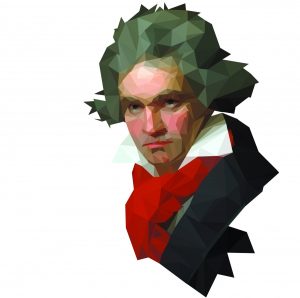It’s not supposed to be easy to play Beethoven’s piano. A reputable Beethoven scholar had to negotiate for eight months with the piano’s owner — the Hungarian National Museum — just to sound a few notes on it. Pianist Shai Wosner played it when he was 12.

“Since my mother happens to be fluent in Hungarian and a good Jewish mother, she thought, you know, it doesn’t hurt to ask — and so she just did,” Wosner said. “And the museum attendant, this elderly lady, had this look to her like, ‘What do I care?’ So she opens this encasement that the piano was in and let me play some of Beethoven’s First Sonata.”
At 8:15 p.m. Saturday, July 21, in the Amphitheater, 30 years after playing Beethoven’s piano, Wosner will open this week’s Beethoven Festival playing Beethoven’s Piano Concerto No. 1 in C major, op. 15, with the Chautauqua Symphony Orchestra and Music Director Rossen Milanov. After intermission, the orchestra will also perform Beethoven’s Symphony No. 2 in D major, op. 36.
This will be the first time Chautauqua Institution has done a festival of this sort in recent years, said Deborah Sunya Moore, vice president
of performing and visual arts. The three Beethoven Festival concerts, she said, will be a chance for both orchestra and audience to get the full Beethoven experience — something Milanov thinks is vitally important.
Beethoven, Milanov said, is a member of a small group of composers whose music speaks so deeply to the human condition that time has not rendered it outdated. These composers — Mozart, Brahms, Tchaikovsky and a few others — explored problems endemic to the human condition that every new generation must address.
But it’s not just the philosophical aspect of his music that sets Beethoven apart, Milanov said. It’s also the craft itself.
“It’s absolutely fascinating how the emotional, philosophical, eternal message of the music is there,” he said. “But if you decide to go inside the music and see how it’s put together, you can see how both the emotional and the rational approach in his music are working so much hand in hand, which is, I think, what probably makes him the greatest.”
For Wosner, too, it’s the music itself that makes Beethoven worthy of such high praise. If the music wasn’t so compelling on its own, he said, listeners probably wouldn’t care about the context or the composer’s life as much.
“The vast majority of his pieces are so sincere and always in search of this ultimate musical truth. You just feel that every note is set in stone, and it just has to be that way. You believe every note that he writes. It’s the most amazing thing.”
–Shai Wosner, Pianist
The pieces on Saturday night’s program are both from Beethoven’s younger days as a composer, often referred to as the early period. Both Wosner and Milanov see these works as foreshadowing the masterpieces that Beethoven had yet to write.
For example, Wosner said, in Piano Concerto No. 1, the slow movement communicates a maturity rare for young composers, hinting at some of the profound slow movements that Beethoven produced later on.
According to Milanov, Symphony No. 2 accomplishes a similar foreshadowing. The third movement is the first time Beethoven uses a scherzo, a jocular dance, in a symphony. It includes a wild fourth movement finale, and, like Piano Concerto No. 1, has a profound slow movement. All of those seeds would eventually grow into trademarks of Beethoven’s music, Milanov said, and so he thinks it’s important that music from the early period gets played.
“I always thought that at least here, Beethoven should not be represented only by his three most popular symphonies, which would be the Fifth, Sixth, and Ninth, which people program more than anything else,” he said.
Wosner shares that sentiment. In his youth, the pianist mostly saw Beethoven as the “irascible” composer, full of passion and defiance — the side Beethoven portrayed in his most popular works. As the pianist grew older and studied more of Beethoven’s music, he realized that, statistically, most of the composer’s music portrays a more gentle, humorous, and optimistic man.
“His persona is not necessarily so much about defying fate, though the life story and the deafness may lead you to think that’s what he’s all about,” Wosner said. “Even more predominant than that is a sort of constant search for truth. And of course you could describe that as a struggle, too, but I see it as a broader thing. He’s always seeking to boil things down to this indivisible atom of music that is eternally true.”




